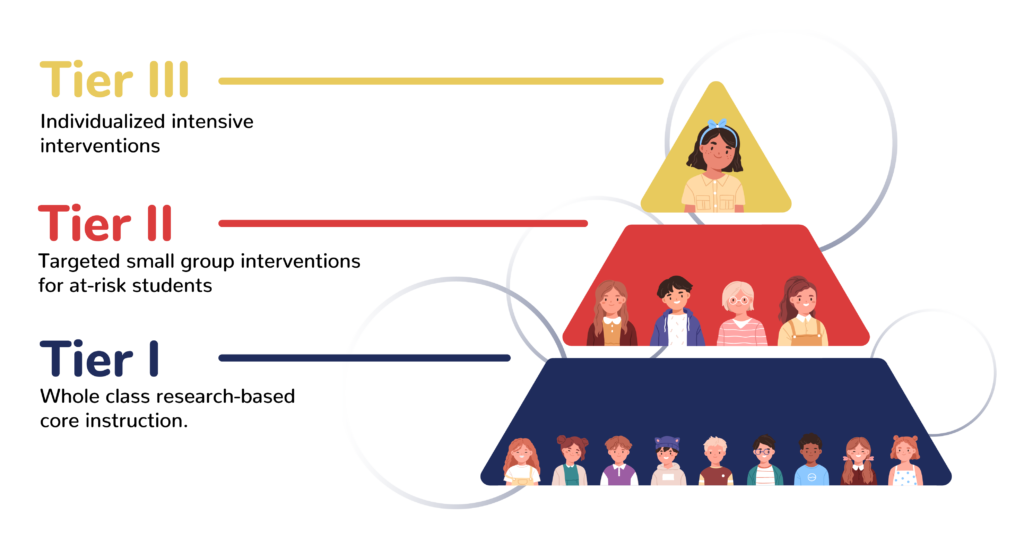Multi-Tiered Systems of Support (MTSS) is an incredibly effective framework for increasing student success. At Abre, we’re big fans of practical methods for supporting students. MTSS is a valuable framework that delivers results. That said, it’s a robust framework involving several steps. We will spend a bit time diving into the components of MTSS with this series.
At its heart, MTSS is a process that helps students grow. It addresses two key areas for students:
- Their academic performance
- Their behaviors
It’s probably not surprising to think that if you can support academics and behaviors, you’ll have students thrive in school.
What are the best ways to help students?
Teachers constantly adjust their instruction and support for students based on what they see in the classroom. MTSS operationalizes this adjustment. MTSS divides support into three tiers.

Tier 1: Universal Support
All students fall under Tier 1. It includes the core instruction and basic interventions involved with standard teaching. Ideally, you want the vast majority of students (75%-90%) to only receive Tier 1 supports.
Tier 2: Small Groups
When Tier 1 isn’t enough, it’s time to group kids to receive Tier 2 interventions. This tier is an extra level of support, typically done in small groups, that feature targeted interventions. For example, a teacher may group students to receive additional reading instruction. Students in Tier 2 should only represent 10 to 25% of a teacher’s class load.
Tier 3: Individual Students
This tier is for students not responding to Tier 1 and Tier 2 supports. It features more intensive interventions and frequently involves outside supports. For example, a student struggling with classroom behavior issues may receive counseling services. Students in Tier 3 should only represent less than 10% of a class.
Curious as to what WORKS in Education?
Wait – Why the Percentages?
Aren’t the percentages…arbitrary? Could you not have a class where 30% qualify for Tier 3 interventions? Or might you have a class where Tier 1 supports are entirely sufficient?
In short, yes.
This is why MTSS is a pragmatic framework. Like with most things in life, education has finite resources (teachers, time, money, etc.), and wisdom is learning how to use those finite resources in the best way possible. Given the limited resources schools face, the percentages are a good rule of thumb.
The Key Components of an MTSS Framework
Now that we’ve defined MTSS, let’s define the components of the framework. To get the most out of your MTSS framework, it should include six key components.
- Screening. Screening tools that assess students in the areas of behavior and academic performance.
- Student plans. A committed plan to address identified struggles.
- Strategies. The use of evidence-based instructional strategies to help students. No gut feelings, if you will.
- Monitoring. Monitor progress to know what is and isn’t working.
- Professional development for educators. Quality educator training is vital to MTSS implementation.
- Family involvement. Supportive family members are integral to the collaborative process.
Pulling all these components together into a coherent process takes effort. Done wrong, this can result in massive inefficiencies and more important, a misalignment between student needs and educator responses. Done well, students grow, teachers focus on teaching, and parents feel part of the learning process.
Our next post wil common approaches to screening students and aligning interventions. We’ll also share best practices, lessons learned from our own experiences as educators, and how to leverage Abre to operationalize your screening process. But in the meantime, if you have any thoughts or questions about MTSS, we’d love to hear from you! Drop us a line at [email protected].
Learn More about Abre and MTSS
We have a robust Webinar that demonstrates how Abre supports MTSS.
Related posts:
Screening Students for Multi-Tiered Systems of Supports: A Practical Guide.
This first stage of an effective MTSS framework is Screening. Learn a practical and easy way to screen your students with Abre....
Creating a Behavior Intervention Plan to Use in the MTSS Process
Part of the MTSS Process frequently involves Behavior Intervention Plans. Abre provides an out-of-the-box experience for Behavior Intervention Plans....
Being a teacher means continuously learning. We love to learn. We love to model learning to our students. We also need credentials to keep our day job. After receiving a teaching license, most states require several additional hours of learning...

